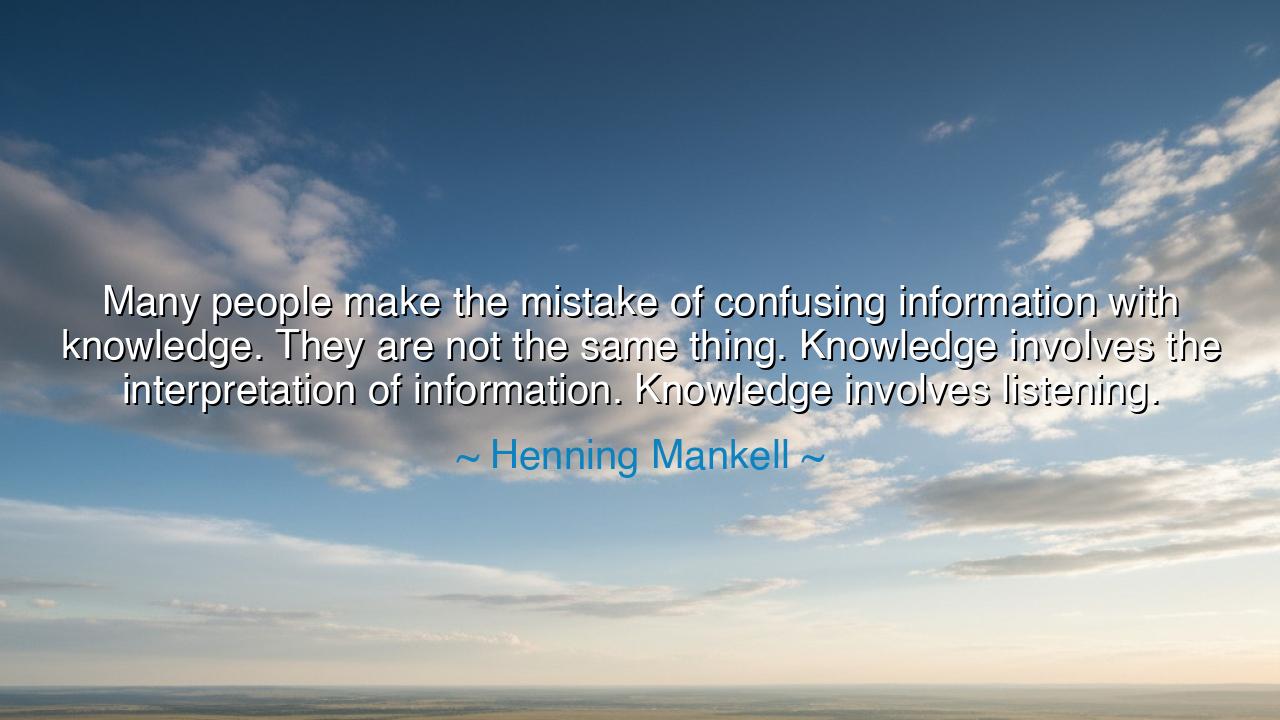
Many people make the mistake of confusing information with
Many people make the mistake of confusing information with knowledge. They are not the same thing. Knowledge involves the interpretation of information. Knowledge involves listening.






Henning Mankell, the teller of stories and the seer of human frailty, once declared: “Many people make the mistake of confusing information with knowledge. They are not the same thing. Knowledge involves the interpretation of information. Knowledge involves listening.” In these words lies a timeless distinction, one often forgotten in an age overflowing with facts and noise. He reminds us that to possess data is not to possess wisdom, and that to truly know requires more than receiving words—it demands interpretation, reflection, and the sacred art of listening.
The origin of his words lies in the modern condition. We live in a world where information is abundant, pouring forth like an endless river from books, newspapers, and now the ceaseless tide of digital screens. Yet amid this abundance, many remain shallow in understanding, for they mistake mere collection for comprehension. Mankell, as a novelist and observer of human struggle, saw how people often drown in facts but starve for wisdom. His call is to distinguish between what fills the ear and what transforms the heart.
The ancients, too, knew this truth well. Socrates declared himself wise only because he knew he knew nothing, reminding us that true knowledge is not the possession of facts but the humble interpretation of them. The sages of the East also spoke of this difference: the Taoist masters taught that to “hear” is not enough—one must learn to “listen” with the inner ear, to perceive meaning beyond words. Thus Mankell’s teaching is not new, but the echo of wisdom carried across millennia, urging us to look beyond the surface of information and seek the depths of knowledge.
History provides vivid examples. Consider the tale of the Challenger disaster in 1986. Engineers possessed all the information needed: data on the O-rings, warnings about cold weather, calculations of risk. Yet decision-makers failed to transform this information into knowledge, for they did not listen—not to the engineers, nor to the quiet truth hidden in the data. The result was tragedy. Here we see the danger of confusing raw facts with interpreted wisdom: to have information is not enough; to truly know is to listen and to act with discernment.
Mankell’s insistence that knowledge involves listening is a profound reminder that wisdom requires humility. To listen is to surrender the pride of always speaking, to open the heart as well as the ear. In every conversation, in every piece of data, there is more than numbers and words—there is the silent cry of meaning waiting to be heard. Those who listen not only with the intellect but with the spirit discover connections others overlook. This is why true leaders, teachers, and healers are often those who first listen, and then act.
The deeper meaning is this: information is external, but knowledge is internal. Information fills the mind; knowledge transforms the soul. Information may be memorized, but knowledge is lived. Information can be shouted, but knowledge whispers, heard only by those who listen with patience and humility. Thus, to grow wise is not to gather more and more, but to interpret, to discern, and to listen until truth is revealed.
The lesson for us is urgent: do not mistake accumulation for wisdom. In your daily life, do not pride yourself on how much you read, how many facts you recall, or how swiftly you answer. Instead, cultivate the art of reflection. Pause. Ask, “What does this truly mean?” and “What is being said beneath the surface of words?” Practice listening—to your teachers, to your peers, to the silent voice of experience within yourself. For in listening, facts become lessons, and lessons become wisdom.
Practical action lies before us all. Slow down in your consumption of information. Read not to finish, but to understand. When others speak, resist the urge to reply immediately; instead, listen deeply for meaning. Journal your reflections, turning raw events into insight. Above all, cultivate humility—the recognition that to truly know is to always be learning. Thus, Henning Mankell’s words shine as a torch: information alone is dust, but when interpreted with care and tempered by listening, it becomes knowledge, and knowledge, in the hands of the wise, becomes the light that guides generations.






AAdministratorAdministrator
Welcome, honored guests. Please leave a comment, we will respond soon